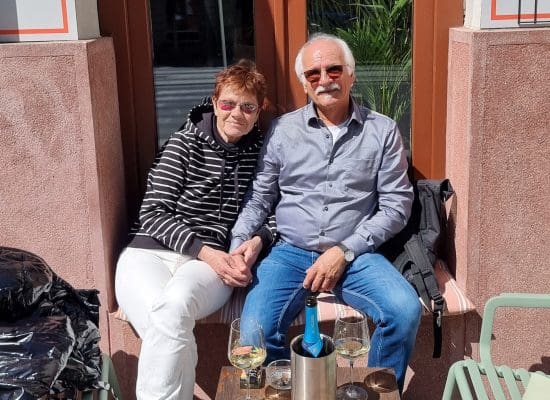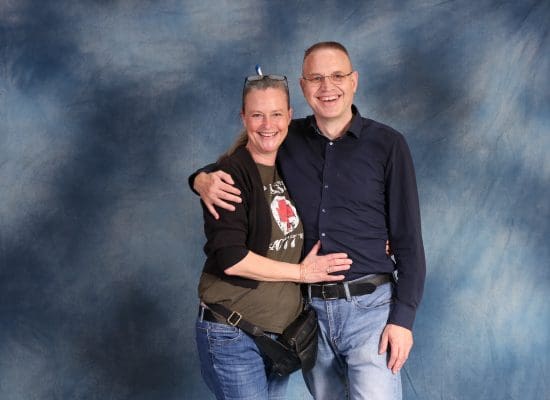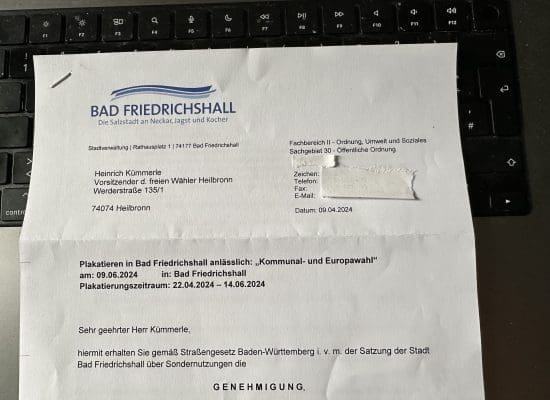Post photo: Walk on the beach
Table of Contents
number plates
It should come as no surprise to anyone, California has license plates too. However, these are only mandatory at the back of the car. For a few years now, you have been able to choose the black and yellow layout again for an additional charge, similar to our ÖHR license plate.
What surprised me this year were temporary license plates that you can print out at home and put on the car as a paper version. A QR code ensures that you can check their legality. Their validity period is also printed legibly.
And just as I was getting used to the paper license plates, I saw my first two digital license plates, arguably some kind of tray in the shape of an ordinary license plate. However, I couldn't find out what it was all about.
It's crumbling
Even during my stay here in California, I cannot avoid sending out my monthly newsletter. And so, since yesterday, two of these have been on the way to the respective subscribers again. I also regularly receive feedback from one of these circulars as to whether they are at least opened by the recipient. According to statistics, on average, less than 30% of recipients open the newsletter. Irrespective of this, I also have to state that the group of recipients has more than halved in less than two years. I am all the more pleased when I receive feedback on the circulars. Because otherwise one could well come to the conclusion that one is writing against walls. In contrast to a personal weblog, one would like to reach one or the other reader with a newsletter.
In the circular I mentioned, I wrote about the fact that things are crumbling everywhere in Europe, not just among the various readerships. Anyone who would like to know more about this is welcome to do so Read the newsletter linked here.
censorship
Hans Müller wrote in his post yesterday about the new American culture war and how right-wing circles no longer shy away from censorship. His statements are very conclusive and, in my opinion, also correct.
He also makes a detour to Europe, more precisely to Hungary, where one of the role models of today's German conservatives is at home. Interestingly, they are currently even making a pilgrimage to Florida, what Hans Müller could have mentioned.
but would have to mention Hans Müller have to realize that censorship is commonplace even here in Germany. Not like in the USA, where the future election victories of the Republicans are to be guaranteed, but rather from a purely "left" ideological point of view. We also remove children's books from school and library shelves and entire series of books or authors have to be rewritten.
I believe that censorship, for whatever reason, is a very terrible and extremely dangerous thing. And neither the books nor later the people will care why they are burned at the stake - no ideology can justify censorship!
"I hope something good happens to you today."
Car inscription, CA-8RBD310 (30.5.2023/XNUMX/XNUMX)








About CENSORSHIP:
If you read what the European governments (D, F, NL, B, etc.) have deleted from Twitter / Facebook etc., then censorship is by no means just a right-wing phenomenon, but is used by all political tendencies, to nip uncomfortable discussions in the bud. Otherwise, the citizen could become “unsettled”. Note: I'm curious whether this comment will appear here or disappear again in Orkus ...
Dear Herr Herzog, Thank you for your comment.
Regarding your comment: I do not know now that I would not have published one of your previous comments. If you "miss" one of your comments, please let me know and I'll take a look.
RE: ... it's crumbling ...
I think that we are seeing phenomena here that almost all other clubs are also confronted with and which have to do with "over-networking and an identifiable backlash" and less with "Euroscepticism".
There is a current study by the Heidelberg Future Institute "Connectivity 2023" in which the current trends are described.
https://www.zukunftsinstitut.de/dossier/megatrend-konnektivitaet/
We need to take note of that and respond to it.
How? I don't have an answer to that either, maybe more with print formats that we hand over personally and throw in the mailboxes?
Rightsizing – the right amount of networking and personal autonomy, ie determining one's own form of communication will probably be the right amount that we have to find.
Ignoring the trend and simply carrying on as before would also be wrong.
Regards
peter schulze
European Union Mannheim
The following statements are interesting:
Connectivity 2023
From all-round networking to new differentiation
"In 2007, the Zukunftsinstitut called connectivity the clearest and most virulent megatrend at the time (which is actually a metatrend): the tendency to network everything with everything - knowledge and information, people and lifestyles, cultures and nations, production processes and machines in the Internet of things. The basic idea: In the context of digitization, everything connects in real time. This was linked to downright revolutionary hopes:
The connection of all people, countries and cultures through networked computer technologies creates new forms of direct democracy and prevents despotism.
Robotics and computer science make monotonous work superfluous, and the enormously increased productivity enables endless prosperity.
The availability of all information leads to a knowledge society, we are all becoming smarter and smarter!
In the digital world, all individuals become self-entrepreneurs. There will be millions of creative companies creating fantastic innovations. Hierarchies are dismantled through networking, power structures eliminated.
Reality has shown that these ideas have largely failed: digital networking encourages hatred and malice at least as much as cooperation. Too much networking leads to an inflammatory culture, to constant frenzy and rushing, to constant distraction and hysterization. To existential stress.
Dictators and tyrants probably used the web more effectively than did liberation movements, see Arab Spring. And the increase in productivity is not, or only slightly, reflected in the economic statistics.
Today, many people tend to complain about the over-connectedness of their lives, while others feel lonely - which this over-connectedness can contribute to. A counter-movement has therefore long since emerged, a silent resistance in everyday life. Millions of people are increasingly turning off their smartphones. They leave the digital universe where it is not good for them. They network in a humane way, whether analog or digital, ideally with the advantages of both domains.
We are thus facing a new phase of real digitality that is repositioning the megatrend of connectivity. In future it will be about differentiation: about rightsizing – the right amount of networking, of autonomy. And: about the development of dignified software and the dissemination of a new ethic of the digital.”
Dear Peter, thanks for the tip. It is indeed a very readable study. I've been looking for a suitable solution for a while too. In the meantime, I have done away with most of the social media for myself and also very limited my own communication channels.
As far as the circulars are concerned, I had already tried to reduce them to just notices of dates. This led to the fact that some readers then also criticized this.
The right solution would actually be to address or write to each individual individually. However, this cannot be achieved by people in voluntary work.
There are still very valid reasons why circulars were invented in the first place.